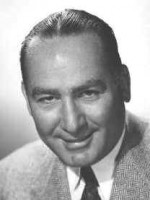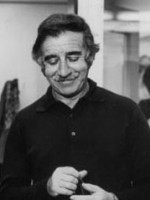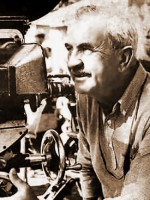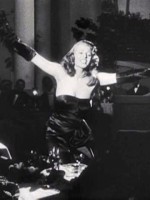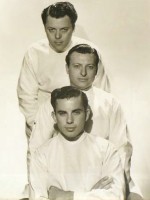Robert Rossen is a Director, Scriptwriter, Producer and Additional Writing American born on 16 march 1908 at New York City (USA)
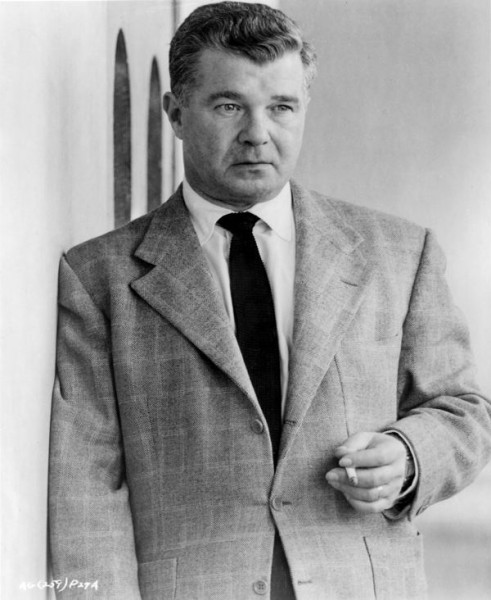
Robert Rossen (March 16, 1908 – February 18, 1966) was an American screenwriter, film director, and producer whose film career spanned almost three decades.
His 1949 film All the King's Men won Oscars for Best Picture, Best Actor and Best Supporting Actress, while Rossen was nominated for an Oscar as Best Director. He won the Golden Globe for Best Director and the film won the Golden Globe Award for Best Picture. In 1961 he made The Hustler, which was nominated for nine Oscars and won two. Rossen was nominated as Best Director and with Sidney Carroll for Best Adapted Screenplay but did not win either award.
After directing and writing for the stage in New York, Rossen moved to Hollywood in 1937. There he worked as a screenwriter for Warner Bros. until 1941, and then interrupted his career to serve until 1944 as the chairman of the Hollywood Writers Mobilization Against the War, a body to organize writers for the effort in World War II. In 1945 he joined a picket line against Warner Bros., making an enemy of Jack Warner. After making one film for Hal Wallis's new-formed production company, Rossen made one for Columbia Pictures, another for Wallis and most of his later films for his own companies, usually in collaboration with Columbia.
Rossen was a member of the American Communist Party from 1937 to about 1947, and believed the Party was "dedicated to social causes of the sort that we as poor Jews from New York were interested in." However, he finally ended all relations with the Party in 1949. Rossen was twice called before the House Un-American Activities Committee (HUAC), in 1951 and in 1953. He exercised his Fifth Amendment rights at his first appearance, refusing to state whether he had ever been a Communist. As a result he was unofficially blacklisted by the Hollywood studio bosses, and he was unable to renew his passport. At his second appearance he named 57 people as current or former Communists and was removed from the unofficial blacklist. Subsequently he had to produce his next film, Mambo, in Italy in 1954 to repair his finances. While The Hustler in 1961 was a great success, conflict with the star of Lilith so disillusioned Rossen that he made no more films during the last three years of his life.
Rossen's films for Warner generally described the conditions of working people, the portrayal of gangsters and racketeers, and opposition to fascism. He wrote that ambition and the desire for success were common themes in his work. His films often featured strong female characters. All Rossen's playscripts were adaptions except three which were based on real events. While head of production at Warner, Wallis considered that some of his best films were written by Rossen.
Robert Rossen, originally known as Robert Rosen, was born on March 16, 1908, and raised on the Lower East Side of New York City. His parents were Russian-Jewish immigrants and his father was a rabbi. As a youth Rossen attended New York University, hustled pool and fought some prizefights.
He started his theatrical career as a director and playwright in stock and off-Broadway productions, mainly in the social and radical theaters that flourished in New York in the early and mid-1930s. In 1932 Rossen directed John Wexley's Steel, about labor agitation, and Richard Maibaum's The Tree, about a lynching. A year later Rossen directed Birthright, in which Maibaum attacked Nazism. In 1935 Rossen wrote and directed The Body Beautiful, a comedy about a naive burlesque dancer. Although the play closed after four performances, Warner Bros. director Mervyn LeRoy was so impressed that in 1936 he signed Rossen to a personal screenwriting contract.
In 1936 Rossen married. A daughter, Carol Eve Rossen, was born in August 1937 and his son, Stephen Rossen, in 1940.
Work in Hollywood
Rossen was a member of the American Communist Party from 1937 to 1947. Later he explained to his son Stephen that he believed the Party was "dedicated to social causes of the sort that we as poor Jews from New York were interested in."
For his first credit in Hollywood, in 1937 Rossen co-wrote with Abem Finkel a script based on the prosecution of crime lord Lucky Luciano and eventually titled Marked Woman. Although some of Warner Bros.' management saw Rossen as an unknown quantity, the result won praise from both Jack Warner and the Daily Worker. Rossen's first solo script was for They Won't Forget (1937), a fictionalized account of the lynching of Leo Frank, featuring Lana Turner in her debut performance.
Dust Be My Destiny, co-written in 1939 by Rossen, is the story of a fugitive from justice who is eventually acquitted with help from an attorney and a journalist, the latter arguing that "a million boys all over the country" were in a similar plight. Warner Bros. then ordered producer Lou Edelman to cut the script, adding that "This is the story of two people – not a group. It is an individual problem – not a national one."
The Sea Wolf, released in 1941, was based on Jack London's novel. Although the film had a strong cast and production, Rossen's re-draft of the script may be the greatest influence on the film. While the character of Captain Larsen remained both victim and oppressed in a capitalist hierarchy, he also became a symbol of fascism. Rossen also split the novel's idealist hero into an intellectual bosun and a rebellious seaman. Warner Bros. cut many political points during production.
After the Attack on Pearl Harbor on December 7, 1941, the Screen Writers Guild set up on December 8, 1941, the Hollywood Writers Mobilization Against the War, a body to organize writers for the war effort. Rossen served as the body's chairman until 1944 and advocated the opening of a second front to support West European resistance again the Nazis. He was now seen as a patriot rather than a radical, and his earnings were much greater than in 1937. However, his work for Hollywood Writers Mobilization and for the Communist Party forced him to abandon some partly developed film projects, including The Treasure of the Sierra Madre, which John Huston eventually directed in 1948.
In 1945 Rossen joined a picket line against Warner Bros., making an enemy of Jack Warner. Rossen signed a contract with an independent production company formed by Hal Wallis, who had previously been Warner Bros.' head of production. However Rossen wrote only two full scripts for this company, The Strange Love of Martha Ivers in 1946 and Desert Fury in 1947. In The Strange Love of Martha Ivers Rossen used a short story by John Patrick to introduce the main plot, which was set fifteen years later and which Rossen wrote himself. The relationship between Rossen and Wallis broke down when Rossen received offers from other production companies.
Dick Powell had been a crooner but was making a new career as a dramatic actor. When Columbia Pictures agreed to make Johnny O'Clock for him in 1947, Powell successfully campaigned for Rossen to direct, and this became Rossen's debut in directing. As this crime melodrama proved a modest success, Roberts Productions signed Rossen to direct Abraham Polonsky's script of Body and Soul, described by Bob Thomas as "possibly the best prizefight film ever made." Rossen preferred an ending in which the hero wins a boxing match and then is killed by a gangster, but Polonsky insisted on his own ending, in which the hero escapes into obscurity before the fight. Following the success of Body and Soul, Rossen formed his own company and signed with Columbia Pictures a contract that gave him wide autonomy over every second film that he made at the studio.
All the King's Men (1949) was based on the novel of the same name by Robert Penn Warren, which in turn was based on the career of the Louisiana politician Huey Long. Rossen introduced a new concept, that the defenders of the ordinary people can in turn become the new exploiters. As a requirement for his participation in the film, Rossen had to write to Columbia's Harry Cohn saying that he was no longer a Communist Party member. Cohn's critiques of draft of Rossen's script including scrapping a framing structure that was difficult for audiences to follow, and several improvements in the relationships and motivations of characters. A meeting of the Communist Party in Los Angeles severely criticized the film, and Rossen finally ended all relations with the Party. All the King's Men won the Academy Award for Best Picture, Broderick Crawford won the award for Best Actor and Mercedes McCambridge was honored as Best Supporting Actress. Rossen was nominated for an Academy Award for Best Director but lost to Joseph L. Mankiewicz for A Letter to Three Wives. Rossen won a Golden Globe for Best Director and the film won the Golden Globe for Best Picture.
The Brave Bulls was directed in 1950 and released in 1951. This was Rossen's last work before studios blacklisted him. The New York Times critic called this "the best film on bull-fighting yet."
Examinations by HUAC
After the end of World War II in 1945, the USA became alarmed by the spread of Communism. In 1946, the Republicans gained an overwhelming majority in the Congressional elections. The Communist victory of China in 1949 and the start of the Korean War in 1950 reinforced the fear and extended it to Hollywood, where the film companies also opposed attempts to organize an industry-wide trade union. Conservative and right-wing groups fought to undo many of the liberal measures of Franklin D. Roosevelt's presidencies.
During hearings in 1947, Jack Warner included Rossen among many leftist writers whom Warner accused of incorporating Communist propaganda in scripts, and whom he claimed to have fired. Rossen was one of 19 "unfriendly witnesses" subpoenaed in October 1947 by the House Un-American Activities Committee (HUAC) during the second Red Scare but was one of eight not called to testify.
In 1951, however, Rossen was named as a Communist by several HUAC witnesses and he appeared before HUAC for the first time in June of that year. He exercised his rights under the Fifth Amendment against self-incrimination, taking what came to be known as the "augmented Fifth". He testified that he was not a member of the Communist Party and that he disagreed with the aims of the party but when asked to state whether he had ever been a member of the party, Rossen refused to answer. He was placed on the unofficial blacklist by the Hollywood studios, and Columbia broke its production contract with him.
Rossen could not renew his passport, and in May 1953, Rossen again appeared before the committee and named 57 people as Communists. He explained to the committee why he chose to testify: "I don't think, after two years of thinking, that any one individual can indulge himself in the luxury of personal morality or pit it against what I feel today very strongly is the security and safety of this nation." Stephen Rossen later shed light on his father's decision: "It killed him not to work. He was torn between his desire to work and his desire not to talk, and he didn't know what to do. What I think he wanted to know was, what would I think of him if he talked? He didn't say it in that way, though. Then he explained to me the politics of it—how the studios were in on it, and there was never any chance of his working. He was under pressure, he was sick, his diabetes was bad, and he was drinking. By this time I understood that he had refused to talk before and had done his time, from my point of view. What could any kid say at that point? You say, 'I love you and I'm behind you.' "
Return to filmmaking
From 1952 to 1953, Rossen wrote Mambo, trying to repair his finances after almost two years without work following the 1951 HUAC hearing. He had to produce the film in Italy, and it was premiered in Italy in 1954 and the USA in 1955. Rossen later said "Mambo was to be for fun only," but he "took it seriously, and it didn't come off." Contemporary critics dismissed the film. However, in 2001 Dorothea Fischer-Hornung concluded that the film achieved more than Rossen and contemporary critics realised: the female lead resolves her own conflicts by devoting herself to dance; Katherine Dunham's choreography highlights this process; and innovative cinematography intensifies the dance scenes.
Rossen hoped Alexander the Great (1956) would be a blockbuster, but the majority of the reviews criticized the film for failing to keep the audience's interest. However, the review from The New York Times wrote that "its moments of boredom are rare ... an overlong but thoughtful and spectacular entertainment."
In 1961, Rossen co-wrote, produced and directed The Hustler. Drawing upon his own experiences as a pool hustler, Rossen teamed with Sidney Carroll to adapt the novel of the same name for the screen. The Hustler was nominated for nine Academy Awards and won two. Rossen was nominated as Best Director and with Carroll for Best Adapted Screenplay but did not win either award. He was named Best Director by the New York Film Critics Circle and shared with Carroll the Writers Guild of America Award for Best Written Drama. The Hustler was an enormous popular success and is credited with sparking a resurgence in the popularity of pool in the United States, which had been on the decline for decades.
Rossen was already ill when he started on his final film, Lilith (1964), and it was poorly received in the USA. After it Rossen lost interest in directing, reportedly because of conflicts with the film's star, Warren Beatty. The filmmaker said, "It isn't worth that kind of grief. I won't take it any more. I have nothing to say on the screen right now. Even if I never make another picture, I've got The Hustler on my record. I'm content to let that one stand for me." However, at the time of his death Rossen was planning Cocoa Beach, a script he conceived in 1962, showing the hopes and struggles of transients in a local community and contrasting this with nearby Cape Canaveral, which Neve described as a "symbol of America’s imperial reach".
Later life
Rossen married Sue Siegal in 1954. He died in New York City at age 57 on February 18, 1966, following a series of illnesses and is interred at Westchester Hills Cemetery in Hastings-on-Hudson, New York. He was survived by his wife Sue, son Stephen and daughters Carol and Ellen.
His grandchild, Daniel Rossen, is the guitarist/vocalist of alternative bands Grizzly Bear and Department of Eagles.
Source : Wikidata
Robert Rossen

- Infos
- Photos
- Best films
- Family
- Characters
- Awards
Nationality USA
Birth 16 march 1908 at New York City (USA)
Death 18 february 1966 (at 57 years) at Hollywood (USA)
Awards Writers Guild of America Award
Birth 16 march 1908 at New York City (USA)
Death 18 february 1966 (at 57 years) at Hollywood (USA)
Awards Writers Guild of America Award
Robert Rossen (March 16, 1908 – February 18, 1966) was an American screenwriter, film director, and producer whose film career spanned almost three decades.
His 1949 film All the King's Men won Oscars for Best Picture, Best Actor and Best Supporting Actress, while Rossen was nominated for an Oscar as Best Director. He won the Golden Globe for Best Director and the film won the Golden Globe Award for Best Picture. In 1961 he made The Hustler, which was nominated for nine Oscars and won two. Rossen was nominated as Best Director and with Sidney Carroll for Best Adapted Screenplay but did not win either award.
After directing and writing for the stage in New York, Rossen moved to Hollywood in 1937. There he worked as a screenwriter for Warner Bros. until 1941, and then interrupted his career to serve until 1944 as the chairman of the Hollywood Writers Mobilization Against the War, a body to organize writers for the effort in World War II. In 1945 he joined a picket line against Warner Bros., making an enemy of Jack Warner. After making one film for Hal Wallis's new-formed production company, Rossen made one for Columbia Pictures, another for Wallis and most of his later films for his own companies, usually in collaboration with Columbia.
Rossen was a member of the American Communist Party from 1937 to about 1947, and believed the Party was "dedicated to social causes of the sort that we as poor Jews from New York were interested in." However, he finally ended all relations with the Party in 1949. Rossen was twice called before the House Un-American Activities Committee (HUAC), in 1951 and in 1953. He exercised his Fifth Amendment rights at his first appearance, refusing to state whether he had ever been a Communist. As a result he was unofficially blacklisted by the Hollywood studio bosses, and he was unable to renew his passport. At his second appearance he named 57 people as current or former Communists and was removed from the unofficial blacklist. Subsequently he had to produce his next film, Mambo, in Italy in 1954 to repair his finances. While The Hustler in 1961 was a great success, conflict with the star of Lilith so disillusioned Rossen that he made no more films during the last three years of his life.
Rossen's films for Warner generally described the conditions of working people, the portrayal of gangsters and racketeers, and opposition to fascism. He wrote that ambition and the desire for success were common themes in his work. His films often featured strong female characters. All Rossen's playscripts were adaptions except three which were based on real events. While head of production at Warner, Wallis considered that some of his best films were written by Rossen.
Biography
Early life and careerRobert Rossen, originally known as Robert Rosen, was born on March 16, 1908, and raised on the Lower East Side of New York City. His parents were Russian-Jewish immigrants and his father was a rabbi. As a youth Rossen attended New York University, hustled pool and fought some prizefights.
He started his theatrical career as a director and playwright in stock and off-Broadway productions, mainly in the social and radical theaters that flourished in New York in the early and mid-1930s. In 1932 Rossen directed John Wexley's Steel, about labor agitation, and Richard Maibaum's The Tree, about a lynching. A year later Rossen directed Birthright, in which Maibaum attacked Nazism. In 1935 Rossen wrote and directed The Body Beautiful, a comedy about a naive burlesque dancer. Although the play closed after four performances, Warner Bros. director Mervyn LeRoy was so impressed that in 1936 he signed Rossen to a personal screenwriting contract.
In 1936 Rossen married. A daughter, Carol Eve Rossen, was born in August 1937 and his son, Stephen Rossen, in 1940.
Work in Hollywood
Rossen was a member of the American Communist Party from 1937 to 1947. Later he explained to his son Stephen that he believed the Party was "dedicated to social causes of the sort that we as poor Jews from New York were interested in."
For his first credit in Hollywood, in 1937 Rossen co-wrote with Abem Finkel a script based on the prosecution of crime lord Lucky Luciano and eventually titled Marked Woman. Although some of Warner Bros.' management saw Rossen as an unknown quantity, the result won praise from both Jack Warner and the Daily Worker. Rossen's first solo script was for They Won't Forget (1937), a fictionalized account of the lynching of Leo Frank, featuring Lana Turner in her debut performance.
Dust Be My Destiny, co-written in 1939 by Rossen, is the story of a fugitive from justice who is eventually acquitted with help from an attorney and a journalist, the latter arguing that "a million boys all over the country" were in a similar plight. Warner Bros. then ordered producer Lou Edelman to cut the script, adding that "This is the story of two people – not a group. It is an individual problem – not a national one."
The Sea Wolf, released in 1941, was based on Jack London's novel. Although the film had a strong cast and production, Rossen's re-draft of the script may be the greatest influence on the film. While the character of Captain Larsen remained both victim and oppressed in a capitalist hierarchy, he also became a symbol of fascism. Rossen also split the novel's idealist hero into an intellectual bosun and a rebellious seaman. Warner Bros. cut many political points during production.
After the Attack on Pearl Harbor on December 7, 1941, the Screen Writers Guild set up on December 8, 1941, the Hollywood Writers Mobilization Against the War, a body to organize writers for the war effort. Rossen served as the body's chairman until 1944 and advocated the opening of a second front to support West European resistance again the Nazis. He was now seen as a patriot rather than a radical, and his earnings were much greater than in 1937. However, his work for Hollywood Writers Mobilization and for the Communist Party forced him to abandon some partly developed film projects, including The Treasure of the Sierra Madre, which John Huston eventually directed in 1948.
In 1945 Rossen joined a picket line against Warner Bros., making an enemy of Jack Warner. Rossen signed a contract with an independent production company formed by Hal Wallis, who had previously been Warner Bros.' head of production. However Rossen wrote only two full scripts for this company, The Strange Love of Martha Ivers in 1946 and Desert Fury in 1947. In The Strange Love of Martha Ivers Rossen used a short story by John Patrick to introduce the main plot, which was set fifteen years later and which Rossen wrote himself. The relationship between Rossen and Wallis broke down when Rossen received offers from other production companies.
Dick Powell had been a crooner but was making a new career as a dramatic actor. When Columbia Pictures agreed to make Johnny O'Clock for him in 1947, Powell successfully campaigned for Rossen to direct, and this became Rossen's debut in directing. As this crime melodrama proved a modest success, Roberts Productions signed Rossen to direct Abraham Polonsky's script of Body and Soul, described by Bob Thomas as "possibly the best prizefight film ever made." Rossen preferred an ending in which the hero wins a boxing match and then is killed by a gangster, but Polonsky insisted on his own ending, in which the hero escapes into obscurity before the fight. Following the success of Body and Soul, Rossen formed his own company and signed with Columbia Pictures a contract that gave him wide autonomy over every second film that he made at the studio.
All the King's Men (1949) was based on the novel of the same name by Robert Penn Warren, which in turn was based on the career of the Louisiana politician Huey Long. Rossen introduced a new concept, that the defenders of the ordinary people can in turn become the new exploiters. As a requirement for his participation in the film, Rossen had to write to Columbia's Harry Cohn saying that he was no longer a Communist Party member. Cohn's critiques of draft of Rossen's script including scrapping a framing structure that was difficult for audiences to follow, and several improvements in the relationships and motivations of characters. A meeting of the Communist Party in Los Angeles severely criticized the film, and Rossen finally ended all relations with the Party. All the King's Men won the Academy Award for Best Picture, Broderick Crawford won the award for Best Actor and Mercedes McCambridge was honored as Best Supporting Actress. Rossen was nominated for an Academy Award for Best Director but lost to Joseph L. Mankiewicz for A Letter to Three Wives. Rossen won a Golden Globe for Best Director and the film won the Golden Globe for Best Picture.
The Brave Bulls was directed in 1950 and released in 1951. This was Rossen's last work before studios blacklisted him. The New York Times critic called this "the best film on bull-fighting yet."
Examinations by HUAC
After the end of World War II in 1945, the USA became alarmed by the spread of Communism. In 1946, the Republicans gained an overwhelming majority in the Congressional elections. The Communist victory of China in 1949 and the start of the Korean War in 1950 reinforced the fear and extended it to Hollywood, where the film companies also opposed attempts to organize an industry-wide trade union. Conservative and right-wing groups fought to undo many of the liberal measures of Franklin D. Roosevelt's presidencies.
During hearings in 1947, Jack Warner included Rossen among many leftist writers whom Warner accused of incorporating Communist propaganda in scripts, and whom he claimed to have fired. Rossen was one of 19 "unfriendly witnesses" subpoenaed in October 1947 by the House Un-American Activities Committee (HUAC) during the second Red Scare but was one of eight not called to testify.
In 1951, however, Rossen was named as a Communist by several HUAC witnesses and he appeared before HUAC for the first time in June of that year. He exercised his rights under the Fifth Amendment against self-incrimination, taking what came to be known as the "augmented Fifth". He testified that he was not a member of the Communist Party and that he disagreed with the aims of the party but when asked to state whether he had ever been a member of the party, Rossen refused to answer. He was placed on the unofficial blacklist by the Hollywood studios, and Columbia broke its production contract with him.
Rossen could not renew his passport, and in May 1953, Rossen again appeared before the committee and named 57 people as Communists. He explained to the committee why he chose to testify: "I don't think, after two years of thinking, that any one individual can indulge himself in the luxury of personal morality or pit it against what I feel today very strongly is the security and safety of this nation." Stephen Rossen later shed light on his father's decision: "It killed him not to work. He was torn between his desire to work and his desire not to talk, and he didn't know what to do. What I think he wanted to know was, what would I think of him if he talked? He didn't say it in that way, though. Then he explained to me the politics of it—how the studios were in on it, and there was never any chance of his working. He was under pressure, he was sick, his diabetes was bad, and he was drinking. By this time I understood that he had refused to talk before and had done his time, from my point of view. What could any kid say at that point? You say, 'I love you and I'm behind you.' "
Return to filmmaking
From 1952 to 1953, Rossen wrote Mambo, trying to repair his finances after almost two years without work following the 1951 HUAC hearing. He had to produce the film in Italy, and it was premiered in Italy in 1954 and the USA in 1955. Rossen later said "Mambo was to be for fun only," but he "took it seriously, and it didn't come off." Contemporary critics dismissed the film. However, in 2001 Dorothea Fischer-Hornung concluded that the film achieved more than Rossen and contemporary critics realised: the female lead resolves her own conflicts by devoting herself to dance; Katherine Dunham's choreography highlights this process; and innovative cinematography intensifies the dance scenes.
Rossen hoped Alexander the Great (1956) would be a blockbuster, but the majority of the reviews criticized the film for failing to keep the audience's interest. However, the review from The New York Times wrote that "its moments of boredom are rare ... an overlong but thoughtful and spectacular entertainment."
In 1961, Rossen co-wrote, produced and directed The Hustler. Drawing upon his own experiences as a pool hustler, Rossen teamed with Sidney Carroll to adapt the novel of the same name for the screen. The Hustler was nominated for nine Academy Awards and won two. Rossen was nominated as Best Director and with Carroll for Best Adapted Screenplay but did not win either award. He was named Best Director by the New York Film Critics Circle and shared with Carroll the Writers Guild of America Award for Best Written Drama. The Hustler was an enormous popular success and is credited with sparking a resurgence in the popularity of pool in the United States, which had been on the decline for decades.
Rossen was already ill when he started on his final film, Lilith (1964), and it was poorly received in the USA. After it Rossen lost interest in directing, reportedly because of conflicts with the film's star, Warren Beatty. The filmmaker said, "It isn't worth that kind of grief. I won't take it any more. I have nothing to say on the screen right now. Even if I never make another picture, I've got The Hustler on my record. I'm content to let that one stand for me." However, at the time of his death Rossen was planning Cocoa Beach, a script he conceived in 1962, showing the hopes and struggles of transients in a local community and contrasting this with nearby Cape Canaveral, which Neve described as a "symbol of America’s imperial reach".
Later life
Rossen married Sue Siegal in 1954. He died in New York City at age 57 on February 18, 1966, following a series of illnesses and is interred at Westchester Hills Cemetery in Hastings-on-Hudson, New York. He was survived by his wife Sue, son Stephen and daughters Carol and Ellen.
His grandchild, Daniel Rossen, is the guitarist/vocalist of alternative bands Grizzly Bear and Department of Eagles.
Best films
Usually with
Filmography of Robert Rossen (30 films)
Director
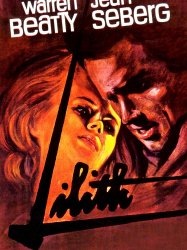
Lilith (1964)
, 1h54Directed by Robert Rossen
Origin USA
Genres Drama, Thriller, Romance
Themes Medical-themed films, Psychologie, Films about psychiatry, Films set in psychiatric hospitals
Actors Warren Beatty, Jean Seberg, Peter Fonda, Kim Hunter, Jessica Walter, Anne Meacham
Rating67%





Set in a private mental institution, Chestnut Lodge in Rockville, Maryland, the film tells of a trainee occupational therapist, a troubled ex-soldier named Vincent Bruce (Beatty), who becomes dangerously obsessed with seductive, artistic, schizophrenic patient Lilith Arthur (Seberg). Bruce makes progress helping Lilith emerge from seclusion and leave the institutional grounds for a day in the country, and accompanies her on other excursions in which she is alone with him. She attempts to seduce him, and eventually Bruce tells Lilith he is in love with her. Lilith also seduces an older female patient, and enchants a couple of young boys on one her outings. Bruce triggers the suicide of another patient (Fonda) out of jealousy over the patient's crush on Lilith. This brings up memories in Lilith of her brother's suicide, which she implies was due to an incestuous relationship which she initiated, and she goes on a destructive rampage in her room and winds up in a catatonic state. Bruce presents himself to his superiors for psychiatric help.

The Hustler (1961)
, 2h14Directed by Robert Rossen, Ulu Grosbard
Origin USA
Genres Drama, Romance
Themes Sports films, Children's films, Escroquerie
Actors Paul Newman, Jackie Gleason, Piper Laurie, George C. Scott, Myron McCormick, Murray Hamilton
Rating79%





Small-time pool hustler "Fast Eddie" Felson travels cross-country with his partner Charlie to challenge the legendary player "Minnesota Fats". Arriving at Fats' home pool hall, Eddie declares he will win $10,000 that night. Fats arrives and he and Eddie agree to play straight pool for $200 a game. After initially falling behind, Eddie surges back to being $1,000 ahead and suggests raising the bet to $1,000 a game; Fats agrees. He sends out a runner, Preacher, to Johnny's Bar, ostensibly for whiskey, but really to get professional gambler Bert Gordon to the hall. Eddie gets ahead $11,000 and Charlie tries to convince him to quit, but Eddie insists the game will end only when Fats says it is over. Fats agrees to continue after Bert labels Eddie a "loser." After 25 hours and an entire bottle of bourbon, Eddie is ahead over $18,000, but loses it all along with all but $200 of his original stake. At their hotel later, Eddie leaves half of the remaining stake with a sleeping Charlie and leaves.

They Came to Cordura (1959)
, 2h3Directed by Robert Rossen
Origin USA
Genres Drama, War, Action, Adventure, Western
Actors Gary Cooper, Rita Hayworth, Van Heflin, Dick York, Tab Hunter, Richard Conte
Rating63%





In 1916, as U.S. soldiers chase after Pancho Villa, Army Major Thomas Thorn (Gary Cooper) is assigned to be a battlefield observer and reward heroism. He has been suggested for this duty by a Colonel Rogers (Robert Keith), who is 63 years old and impatiently yearning to be promoted to general before mandatory retirement a few months hence.

Island in the Sun (1957)
, 2hDirected by Robert Rossen
Origin USA
Genres Drama, Romance
Themes Seafaring films, Transport films, Children's films
Actors James Mason, Harry Belafonte, Joan Fontaine, Joan Collins, Dorothy Dandridge, Michael Rennie
Rating61%





The film follows several characters, black, white as well as mixed. Maxwell Fleury (James Mason) is a white plantation owner's son who suffers from an inferiority complex and makes rash decisions to prove his worth. Maxwell is tormented by jealousy of his wife, Sylvia (Patricia Owens) and is envious of his younger sister Jocelyn (Joan Collins), who is being courted by the Oxford-bound Euan Templeton (Stephen Boyd), a war hero visiting the Governor of the island, his father Lord Templeton (Ronald Squire).

Alexander the Great (1956)
, 2h21Directed by Robert Rossen, Bernard Vorhaus
Origin USA
Genres Drama, War, Biography, Action, Adventure, Historical, Peplum, Romance
Themes Politique, Political films, Films about royalty
Actors Richard Burton, Claire Bloom, Fredric March, Danielle Darrieux, Michael Hordern, Harry Andrews
Rating58%





In the beginning of the film, Demosthenes is propagating for war to resist Philip II's takeover of Greek city-states.

Mambo (1954)
, 1h50Directed by Robert Rossen
Origin USA
Genres Drama
Actors Silvana Mangano, Michael Rennie, Vittorio Gassman, Shelley Winters, Katherine Dunham, Eduardo Ciannelli
Rating58%





The film stars Silvana Mangano as Giovanna Masetti, a poor Venetian who is admired by the crafty croupier Mario Rossi (Vittorio Gassman) and the rich count Enrico Marisoni (Michael Rennie). Giovanna lives out a dream to become a dancer and moves to Rome. She returns six months later to the competing affections of Mario and Enrico, resulting in a choice between the two and the dramatic finale.
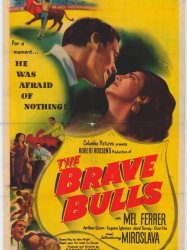
The Brave Bulls (1951)
, 1h46Directed by Robert Rossen
Origin USA
Genres Drama, Romance
Actors Mel Ferrer, Miroslava, Anthony Quinn, José Torvay
Rating60%






All the King's Men (1949)
, 1h49Directed by Robert Rossen, Don Siegel, Sam Nelson
Origin USA
Genres Drama
Themes Political films
Actors Broderick Crawford, John Ireland, Joanne Dru, John Derek, Mercedes McCambridge, Ralph Dumke
Rating73%





The story of the rise of politician Willie Stark (Broderick Crawford) from a rural county seat to the governor's mansion is depicted in the film. He goes into politics, railing against the corruptly run county government, but loses his race for county treasurer, in the face of unfair obstacles placed by the local machine. Stark teaches himself law, and as a lawyer, continues to fight the local establishment, championing the local people and gaining popularity. He eventually rises to become a candidate for governor, narrowly losing his first race, then winning on his second attempt. Along the way he loses his innocence and becomes as corrupt as the politicians he once fought against. When his son becomes paralyzed following a drunk driving accident that kills a female passenger, Stark's world starts to unravel and he discovers that not everyone can be bought off.

Body and Soul (1947)
, 1h44Directed by Robert Rossen, Robert Aldrich
Origin USA
Genres Drama
Themes Sports films, Martial arts films, Boxing films, Le boxe anglaise
Actors John Garfield, Lilli Palmer, Hazel Brooks, Anne Revere, William Conrad, Joseph Pevney
Rating75%





Charley Davis, against the wishes of his mother, becomes a boxer. As he becomes more successful the fighter becomes surrounded by shady characters, including an unethical promoter named Roberts, who tempt the man with a number of vices. Charley finds himself faced with increasingly difficult choices.

Johnny O'Clock (1947)
, 1h35Directed by Robert Rossen
Origin USA
Genres Drama, Noir, Crime
Actors Dick Powell, Evelyn Keyes, Lee J. Cobb, Ellen Drew, Nina Foch, Thomas Gomez
Rating66%





Johnny O'Clock (Dick Powell) is a junior partner in a posh casino with Guido Marchettis (Thomas Gomez). Complicating their longtime working relationship is Guido's wife Nelle (Ellen Drew), who is still in love with former boyfriend Johnny. She gives Johnny an expensive custom pocket watch, the twin of a birthday present she gave her husband, except Johnny's has a romantic engraving on the back.
Scriptwriter

Lilith (1964)
, 1h54Directed by Robert Rossen
Origin USA
Genres Drama, Thriller, Romance
Themes Medical-themed films, Psychologie, Films about psychiatry, Films set in psychiatric hospitals
Actors Warren Beatty, Jean Seberg, Peter Fonda, Kim Hunter, Jessica Walter, Anne Meacham
Roles Ecrivain
Rating67%





Set in a private mental institution, Chestnut Lodge in Rockville, Maryland, the film tells of a trainee occupational therapist, a troubled ex-soldier named Vincent Bruce (Beatty), who becomes dangerously obsessed with seductive, artistic, schizophrenic patient Lilith Arthur (Seberg). Bruce makes progress helping Lilith emerge from seclusion and leave the institutional grounds for a day in the country, and accompanies her on other excursions in which she is alone with him. She attempts to seduce him, and eventually Bruce tells Lilith he is in love with her. Lilith also seduces an older female patient, and enchants a couple of young boys on one her outings. Bruce triggers the suicide of another patient (Fonda) out of jealousy over the patient's crush on Lilith. This brings up memories in Lilith of her brother's suicide, which she implies was due to an incestuous relationship which she initiated, and she goes on a destructive rampage in her room and winds up in a catatonic state. Bruce presents himself to his superiors for psychiatric help.

The Cool World (1963)
, 2h5Directed by Shirley Clarke
Origin USA
Genres Drama, Biography, Documentary, Crime
Actors Antonio Fargas, Carl Lee, Clarence Williams III, Gloria Foster, Richard Ward, Val Bisoglio
Roles Theatre Play
Rating64%





Un regard sur les horreurs du ghetto de Harlem, touché par la drogue, la violence, et la misère, ainsi que par le désespoir dû à la ségrégation raciale de la société américaine.

Billy Budd (1962)
, 2h3Directed by Peter Ustinov
Origin United-kingdom
Genres Drama, Action, Adventure
Themes Seafaring films, Films about music and musicians, Transport films, Musical films, Films based on plays, Films based on operas, Histoire de France, Napoleonic Wars films
Actors Robert Ryan, Peter Ustinov, Terence Stamp, Melvyn Douglas, Paul Rogers, John Neville
Rating77%





In the year 1797, the British naval vessel HMS Avenger (changed from the book; in early drafts it was Indomitable, later ones, Bellipotent) press gangs into service a crewman "according to the Rights of War" from the merchant ship The Rights of Man. The new crewman, Billy Budd (Terence Stamp), is considered naive by his shipmates, and they attempt to indoctrinate him in their cynicism. But Budd's steadfast optimism is impenetrable, as when he is asked to critique the horrible gruel the crew must eat, he offers "It's hot. And there's a lot of it. I like everything about it except the flavor." The crew discovers Budd stammers in his speech when under anxiety.

The Hustler (1961)
, 2h14Directed by Robert Rossen, Ulu Grosbard
Origin USA
Genres Drama, Romance
Themes Sports films, Children's films, Escroquerie
Actors Paul Newman, Jackie Gleason, Piper Laurie, George C. Scott, Myron McCormick, Murray Hamilton
Rating79%





Small-time pool hustler "Fast Eddie" Felson travels cross-country with his partner Charlie to challenge the legendary player "Minnesota Fats". Arriving at Fats' home pool hall, Eddie declares he will win $10,000 that night. Fats arrives and he and Eddie agree to play straight pool for $200 a game. After initially falling behind, Eddie surges back to being $1,000 ahead and suggests raising the bet to $1,000 a game; Fats agrees. He sends out a runner, Preacher, to Johnny's Bar, ostensibly for whiskey, but really to get professional gambler Bert Gordon to the hall. Eddie gets ahead $11,000 and Charlie tries to convince him to quit, but Eddie insists the game will end only when Fats says it is over. Fats agrees to continue after Bert labels Eddie a "loser." After 25 hours and an entire bottle of bourbon, Eddie is ahead over $18,000, but loses it all along with all but $200 of his original stake. At their hotel later, Eddie leaves half of the remaining stake with a sleeping Charlie and leaves.

They Came to Cordura (1959)
, 2h3Directed by Robert Rossen
Origin USA
Genres Drama, War, Action, Adventure, Western
Actors Gary Cooper, Rita Hayworth, Van Heflin, Dick York, Tab Hunter, Richard Conte
Rating63%





In 1916, as U.S. soldiers chase after Pancho Villa, Army Major Thomas Thorn (Gary Cooper) is assigned to be a battlefield observer and reward heroism. He has been suggested for this duty by a Colonel Rogers (Robert Keith), who is 63 years old and impatiently yearning to be promoted to general before mandatory retirement a few months hence.
 Connection
Connection
